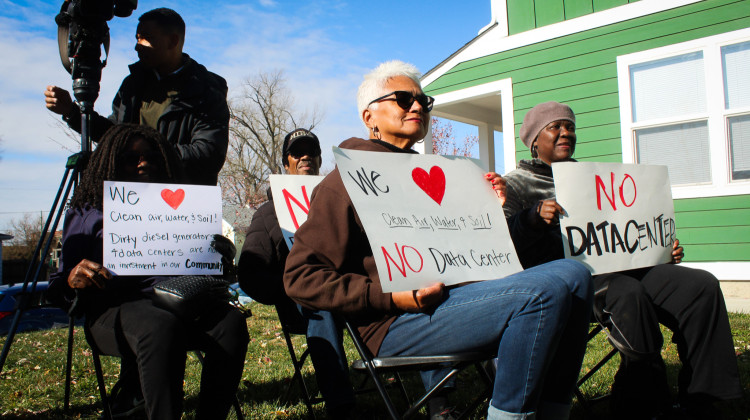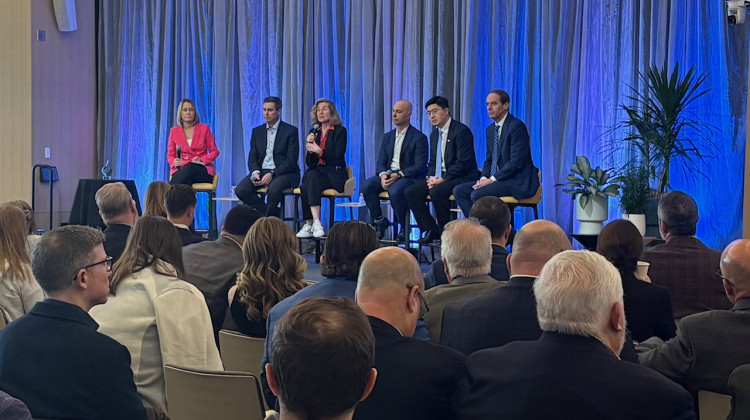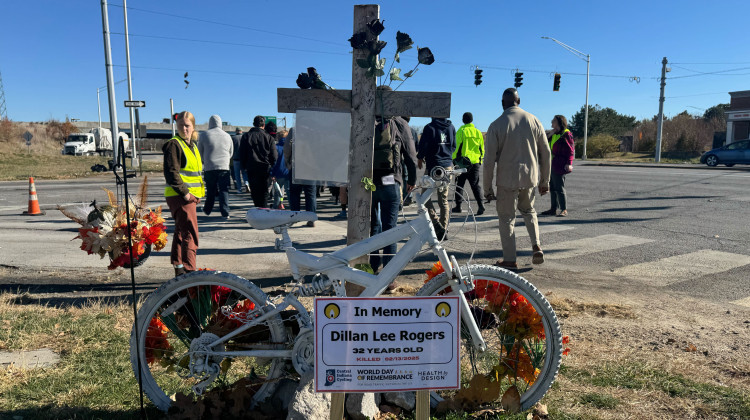
WFYI partnered with the Indianapolis Public Library to host “Growing Healthy Communities,” an event to share resources about lead testing and remediation. Kids participated in crafts and adults left with kits to test for lead at home.
Brittani Howell/WFYILead contamination continues to be an issue in Indianapolis, though many people might not be aware of the risk it poses or how close it is to their own lives. To raise awareness and provide resources, WFYI partnered with the Indianapolis Public Library to host “Growing Healthy Communities,” an event where representatives from Indiana University-Purdue University Indianapolis and the Marion County Public Health Department provided resources about lead testing and remediation.
What’s the deal with lead?
Lead is a health issue. As our reporting team has covered — notably Rebecca Thiele at Indiana Public Broadcasting and Farah Yousry with Side Effects Public Media — lead exposure can make people sick.
In adults, lead can harm the kidneys and cardiovascular system, according to the EPA. It’s particularly harmful for kids: Lead, if ingested, can cause developmental and behavioral issues, as it impacts the part of the brain in charge of impulse control. Those developmental impacts aren’t reversible.
Lead is prevalent in a city like Indianapolis and there are many ways people can be exposed. If your home was built before 1978, there’s a good chance your house has or had lead paint; and when lead paint chips off and gets ground down into tiny particles, it can end up as lead dust. Lead can be outside in the home contaminating the dirt, and it can be in water pipes.
There are local efforts to test more kids for lead so specialists can intervene earlier, and there are efforts underway to replace lead pipes throughout the city. But the issue continues to impact a lot of people, whether they’re aware of the risk or not.
How did this event come about?
WFYI’s health team, Side Effects Public Media, has worked on lead-related issues for years. We started really dedicating community engagement resources to the topic in 2021, when we partnered with Angela Herrmann and her lead-testing team at IUPUI to host an information booth at the Indiana Black Expo’s Minority Health Fair. We handed out resources and kits people could use to test for lead at home.
Herrmann had the idea this year to host an event in conjunction with spring gardening, with a focus on encouraging people to test their soil for lead. We partnered with the Eagle Branch of the Indianapolis Public Library because it’s an accessible gathering space for a community where lead contamination is an issue.
Additionally, because that community has a big Spanish-speaking population, we benefited from the library’s connections to make the event fully bilingual and accessible. To raise awareness of the event to local Spanish-speaking community members, we hired an influencer in the Latino community, Andreina Carrizo; and Marjori Duerte-Sheffield shared it in her regular segment on Telemundo Indy.
So how did it go?
We’re really happy with the turnout. We counted about 45 visitors in all — a mix of kids and their grown-ups as well as adult visitors. Two people got screened for lead, thanks to the Marion County Department of Health team that joined us on site. We heard from a lot of people that they’d seen the event on Instagram. Numbers aside, people walked away smiling, and most of them took garden crafts, seeds and lead information with them. That was really nice to see on a cold and blustery March day.
What’s next?
The presence of lead in our community is an ongoing issue, and our reporters are always looking for stories to cover.
Those of us who put on the Eagle Branch event are in preliminary talks to repeat the event in different parts of the city. We want to make the information accessible to more people in the city in languages other than English, and we want to find ways to partner with more community organizations that serve minority or immigrant communities so they know about the issue.
We welcome ideas and personal testimony, so if you’d like to reach out, email bhowell@wfyi.org.
Contact Side Effects Public Media Community Engagement Specialist Brittani Howell at bhowell@wfyi.org. Follow on Twitter: @_BrittaniHowell.
 DONATE
DONATE






 Support WFYI. We can't do it without you.
Support WFYI. We can't do it without you.